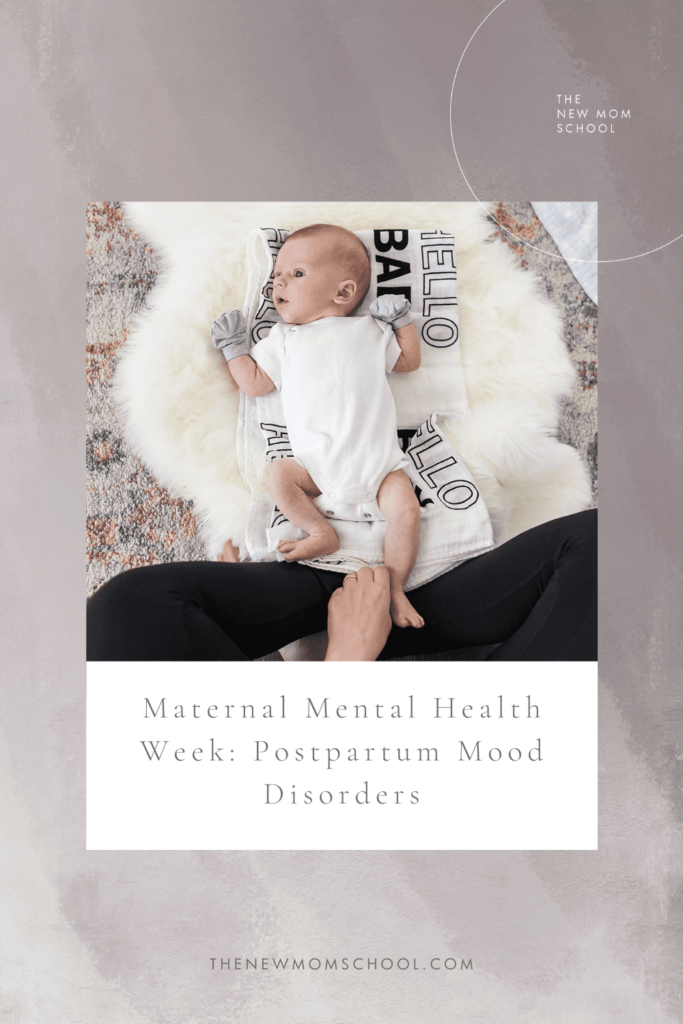Here’s a fun fact: there are just shy of 4 million babies born every year in the United States. While some of those are from the same woman, the clear majority are not, meaning almost 4 million women become mothers or add to their families, annually. A not-so-fun fact: of those 4 million, about 15% will suffer from postpartum depression. That is approximately 600,000 women. Those numbers are extracted from studies of self-reported postpartum depressive symptoms, and don’t even take into account other postpartum mood disorders like anxiety and psychosis, women who do not self-report, and international data. Can you imagine what the true number of suffering mamas is, globally? Astronomical. Yet, postpartum mental health is not discussed nearly enough, and I’m not sure if it’s because of a lack of knowledge surrounding the subject, or society has marked it as a taboo topic, or both – but it impacts way too many women to be tip-toed around.
April 30th-May 6th is Maternal Mental Health Week, and coincidentally (or maybe not so coincidentally), on April 23rd, the ACOG published a redesign of their postpartum care guidelines. To quote the article, “Previously, ACOG recommended a comprehensive postpartum visit take place within the first six weeks after birth. ACOG now recommends that postpartum care should be an ongoing process, rather than a single encounter…and the follow-up should include a full assessment of the following:
- mood and emotional well-being
- infant care and feeding
- sexuality contraception and birth spacing
- sleep and fatigue
- physical recovery from birth
- chronic disease management
- health maintenance
The weeks following birth are a critical period for a woman and her infant, setting the stage for long-term health and well-being. During this time, a woman is adapting to multiple physical, social and psychological changes. She is recovering from childbirth, adjusting to changing hormones and learning to feed and care for her newborn. Postpartum care visits with ob-gyns or other obstetric care providers can help women navigate the new challenges of motherhood. To optimize the health of women and infants, postpartum care should become an ongoing process, rather than a single encounter, with services and support tailored to each woman’s individual needs.”
Take note of the items mentioned on the first bullet point: mood and emotional well-being. There’s a reason why the ACOG listed those first, and I’m glad they did, because it shows the growing importance of focusing on maternal mental health.
When your OB or midwife speaks to you about postpartum mood disorders during your pregnancy (and they absolutely should be, so make sure to bring it up if they don’t), they will give you basic guidelines as to what to expect and, if applicable, when it’s time to seek additional, professional support. Generally speaking, the “baby blues” are considered normal during the first two weeks of your postpartum recovery. Those can manifest in many ways but are commonly seen in things such as: crying for what seems like no reason (we’re out of my favorite ice cream!), irritability (ugh, you’re breathing too loud!), anxiety (please don’t touch or hold my baby!), impatience (just let me burp the baby, I know how to do it!) and sadness (I’ll never have alone time ever again!). The vast majority of new moms experience baby blues in some fashion but, with time, the symptoms start to dissipate, and you slowly exit the thick fog that once engulfed your daily life. Sometimes, however, those symptoms don’t go away, and they can get worse. If your occasional crying and sadness turns into severe mood swings, or if you find yourself withdrawing from loved ones and having extreme feelings of shame or guilt, those may be indications of something a little more serious. And while we all have moments of inadequacy as new moms; these things shouldn’t plague you. Other things to be on the lookout for is if you find yourself living in constant fear or worry, having trouble focusing, or if you have physical symptoms like dizziness or nausea. While a lot of that sounds like normal new mom territory (and it absolutely can be), symptoms of both postpartum depression and anxiety sit on a spectrum and manifest differently in every woman, so it’s important to speak with your health care provider if you do find yourself experiencing any of these symptoms past that initial two-week mark, especially if you’re having thoughts of harming yourself or your baby.
I know that what I just mentioned can seem both scary and daunting. Being someone who suffers from anxiety pre-pregnancy, I was very nervous for what my postpartum journey would look like. A couple of my dearest friends suffered from postpartum depression, so I had told my husband what to look for, and he entered fatherhood knowing he not only had to help look after Avery, but also me. He knows me better than anyone, so he knew when I wasn’t having a good day and made sure to ask me how I was feeling, mentally and emotionally. He still does it to this day, which has been a saving grace because when I went back to work when Avery was eleven weeks old, I was in a dark place, and he was the one to identify it before I was able to. He, along with my closest friends, were the resources I chose to help me out of that dismal time. Fortunately, there are other resources for us mamas, outside of our family and health care providers, in the event we do want to seek additional support. The New Mom School, for example, has a free and confidential pre and postpartum depression and anxiety support group, led by Shira Kfir, LCSW. All you have to do is show up on Tuesdays at 2pm to enter a judgement-free zone and be able to unload and ask questions. If you’re not in the Orange County, CA area, or if you can’t make it to the support group, there are toll-free numbers at your disposal like 1-800-PPD-MOMS, and most hospitals, like Hoag Hospital, have a support line where they can connect you with licensed professionals in your community.
Your mental health should be at the top of your priority list, no matter where in life you are, but especially in your postpartum recovery. If you are one of the women suffering, remember that you are not alone. You don’t have to accept this as your new normal or battle through this by yourself. It may feel like you’re on an island sometimes, but the reality is, you are not. The people around you love you and want to help you be your best self, so if that means seeking out counseling or medication to get yourself there, that is absolutely OK, and you should not think of yourself as any less because of it. We need to do our part in shedding light on these things that impact so many of us. Even if you are not a mom or have never been pregnant, you know a woman who is a mother (even if it’s just your own!). I’ve mentioned previously how much is expected of moms, so it really shouldn’t come as a surprise just how common postpartum mood disorders really are, and it’s increasingly important to be able to identify symptoms in not only yourself, but also the mamas you surround yourself with. Often, it is difficult for a woman to be able to realize she is suffering, so we need to lean on our village, whether that be your partner, parents, friends, Doctors, or maybe even your New Mom School class.
To helping each other in love and confidence,
Melanie
Local Postpartum Support
Breastfeeding Support
The New Mom School Complimentary Breastfeeding Support Group
Please check website for current schedule www.newmomschool.com
Led By: Danielle Gauss, IBCLC
(714) 287-1697
Contact directly to schedule a one-on-one session in your home or in doctor’s office
Postpartum Doula Support in the Home
The Pump Station Postpartum Support Services
Donna Ford
(714) 747-5097
*Discount offered to class members, please inquire!
Therapists Specializing in Postpartum Support
Shira Kfir, LCSW
www.shirakfirlcsw.com
(949) 943-0445
Laura Navarro-Pickens, LCSW
www.therapistlaura.com
(562) 882-7901
Keira Merkovsky, LCSW (Accepts insurance)
http://www.counselingwithkeira.com
(949) 293-9643
Sonya Rasminsky, MD (Psychiatrist)
www.sonyarasminsky.com
(949) 734-4912
Sleep Support
Joanna Martindale
Baby Sleep Concierge
(323) 363-4534


